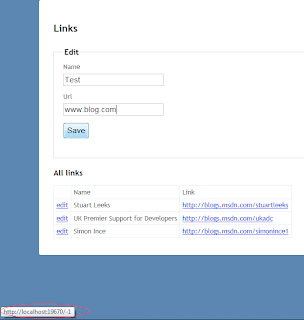Cannot assign <null> to anonymous type property (ASP.NET MVC Object RouteValues)
After reading an article called ASP.NET MVC Partial Rendering by Stewart Leeks, I decided to download the code sample and gave it a spin. As I reviewed each classes and controllers, I needed to implement some changes on saving (ActionResult decorated by [HttpPost]) attribute. The updates would be to pass a value to parameter linkId so that I can add new record after editing a new one.
The first solution I have in mind was to pass a -1 to linkID. This would work but, this will append a -1 to the url being requested.
Image

The second solution was to pass an object to the routeValue. However, this would append a System.Object to the request url.
Image

The last solution I cam to think was to pass a null value to the routeValue. Unluckily, you can't assign a null value to an anonymous type property.
After googling for a few hours, I stumbled upon this article: Assigning null to anonymouse type which is the basis for the accepted solution below.
Image

As you can see from the image above, there is no parameter value to the requested post url.
The first solution I have in mind was to pass a -1 to linkID. This would work but, this will append a -1 to the url being requested.
return RedirectToAction("ListAndEdit", new { linkId = -1 });

The second solution was to pass an object to the routeValue. However, this would append a System.Object to the request url.
return RedirectToAction("ListAndEdit", new { linkId = new object()});

The last solution I cam to think was to pass a null value to the routeValue. Unluckily, you can't assign a null value to an anonymous type property.
return RedirectToAction("ListAndEdit", new { linkId = null});
return RedirectToAction("ListAndEdit", new { linkId = null as object});

As you can see from the image above, there is no parameter value to the requested post url.



Comments
Post a Comment